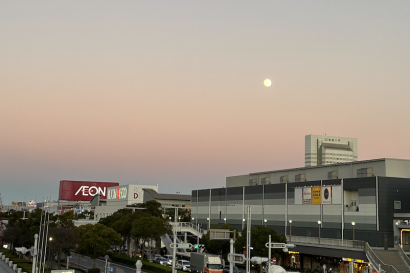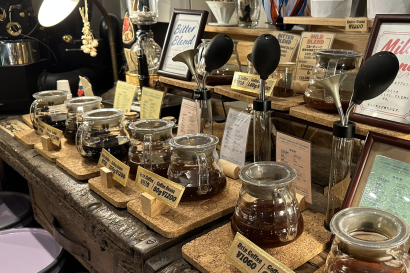Although there was always so much to explore in Tokyo, there is so much more in Japan to see. That is why one of the most memorable experiences studying abroad in Japan was the IES Abroad-sponsored trip to Okinawa Prefecture. A distant island between the Japanese mainland and Taiwan, Okinawa has a rich history, distinct culture, and beautiful scenery. In Tokyo people are always busy, and there is always a train to catch. But there are no trains to catch in Okinawa: everyone drives or takes the bus instead. Okinawan people are more laid-back, and at night the restaurants and izakayas light up in song and dance. And while greenery in Tokyo is confined to parks surrounded by high-rise offices and apartments, Okinawa is lush with foliage that can not be seen on the mainland.
Our trip to Okinawa was planned and supervised by IES Abroad, and they did a fantastic job of showing us all around the island. We swam in glittering beaches, navigated the defenses of Shuri Castle, gazed at whale sharks at Churaumi Aquarium, and joined local university students to learn traditional Eisa dance. In about four days we toured all around the island, enjoying our short vacation away from all our troubles and duties in Tokyo.
And yet, despite all this merriment, there were several small indicators that revealed that not all was peaceful in Okinawa. On our first day, our tour bus passed a house with a large billboard raised on its roof. The sign depicted an Osprey, a twin-rotor aircraft operated by the United States military. The aircraft was crossed out, and the sign boldly stated in English:
“Japan’s Article 9 Constitution is a Treasure to the World”
Okinawa has been embroiled in debate and protest, as opposition to American military bases on the island has been ignited by various incidents. Okinawans have especially been angered by crimes committed by US servicemen, including several high-profile incidents involving murder or sexual assault against locals. The current focus is on the relocation of military base Futenma to Henoko Bay. Many Okinawans, including the current governor, oppose the base being rebuilt on Okinawa at all. In addition to anger against crimes committed by servicemen, people cite noise, pollution, and the overwhelming burden placed upon Okinawans to house military bases. Although Okinawa accounts for only 0.6% of Japanese territory, 62% of Japanese land used for US military bases is in Okinawa prefecture.
Ever since an Osprey crashed into the sea near the island, Okinawans have turned the Osprey into a symbol to rally against. News article about anti-base protests will frequently include pictures of Okinawan people holding signs that depict the Osprey, crossed out. Many gift shops sold merchandise that was not shy about making a political statement. For example, T-shirts sold near Shuri Castle said “NO OSPREY,” with a skeletal hand crushing the word “OSPREY.” In the background, the prefectural flag of Okinawa was prominently displayed.
On our last day in Okinawa, we were supposed to rendezvous at Naha city hall after some free time to go shopping on one of the city’s more touristy avenues, Kokusai-doori. At the city hall, a pair of older men were staging a small protest against the Henoko base. They carried banners with slogans such as “Watashitachi wa Nihonjin!” (We are Japanese!) and “Okinawa wa Nihon desho!” (Okinawa is also Japan, isn’t it?”). Interestingly, their more nationalist slogans and somewhat out-of-place denouncements of Korean and Chinese tourists marked them as right-wing protesters. I was already introduced to left-wing opposition to the bases by one of my co-workers at my labor union field placement in Tokyo, who had actually traveled to Okinawa to join protests before. She stressed the anti-imperialist and anti-war beliefs of the opposition as the primary motivation for herself and many other protesters. Learning about the various forms of discontent against the US military presence in Okinawa taught me more about Japan, but also made me question much of what I have studied or believed as an American.
As an international relations major with an interest in East Asia, I have studied the Japan-US relationship well. And from that distant viewpoint, it makes perfect sense to have a base in Okinawa. It’s a good strategic location, and Japan and America have a close security partnership. Japanese people like America, so everyone wins right? But reality is much more complicated and bitter than that. Okinawans, right or left, sometimes feel that their issues and beliefs are sidelined by the government in Tokyo. Prime Minister Shinzo Abe and the Japanese Diet maintain a careful balance, trying to maintain a good relationship with my own government while taking into account what their people want. And perhaps ironically, I believe they put too much of an emphasis on the former.
Perhaps this can be seen most clearly in the debate around Article 9, alluded to earlier when I mentioned the activist billboard I saw. Article 9 of the Japanese Constitution promises that the Japanese people “forever renounce war” and forbids the country from maintaining military forces. Article 9, along with the rest of the Japanese Constitution, was written by Americans after World War 2. Initially, the American occupiers planned to keep Japan weak and agrarian, so that it would never again threaten America. That changed quickly, and instead the priority shifted towards building war-torn Japan up into a strong American ally during the Cold War. Article 9 was circumvented with American support, and Japan raised “Self-Defense Forces” (JSDF).
Today, there is a huge debate within Japanese politics. Prime Minister Abe’s party, the dominant Liberal Democratic Party (LDP), has been pushing for amendments to Article 9 that would clarify the legality of the JSDF. Opposition parties claim that Abe is seeing to remilitarize Japan, a move that is extremely unpopular with the general population that prefers to maintain the country’s “pacifist” status. Among the critics I have met, the Japanese government is seen as blindly following American pressure to remilitarize, as people back home in America think that Japan is not providing its fair share of military burden.
My time in Okinawa was a welcome vacation, but at the same time left me with much to consider. Not only about Japan, but my own country. From my American perspective of international relations, important details and issues have been blurred. There is America, and there is Japan: a monolithic entity, a state to have a (hopefully) good relationship with. But I have come to realize that no Japan is not just “Japan,” it is a collection of people of different backgrounds and histories. And previously, when I thought of US-Japan relations, I looked at how our governments interacted. But visiting Okinawa has reminded me that things are much more complex than that: people at the margins have priorities too, and they are all too easily placed out-of-focus.

Timothy Valero
<p>Timothy is a third-year East Asian Studies/Diplomacy and World Affairs double major from Occidental College in Los Angeles. Prior to studying abroad, Timothy’s studies have centered on historical and contemporary East Asian and Asian American experiences. He further focuses on social movements and minority rights, and is Vice President of Asian Pacific Americans for Liberation, a cultural/political student organization at his home college. He will be spending his time in Tokyo learning about Japan’s unique history and culture, visiting cat cafes, working hard to improve his Japanese language skills, petting cats, eating as much curry rice as possible, and purchasing cute cat-related items.</p>





